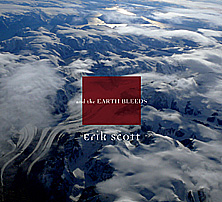 Bass
ace and multi-instrumentalist Erik Scott is one among a few
select rock musicians who made a successful foray into the world of
experimental jazz-rock and even borrows from what some dare to still
call New Age. Erik Scott’s 2014 CD, And The Earth Bleeds
is filled with such a wide range of instrumental and pop/rock
vocal music, it will make your head spin. Erik’s 2011 CD, Other
Planets was an instrumental music classic, although on And
The Earth Bleeds he blends in several vocal tracks amid his instrumental
excursions. Erik Scott’s sonically adventurous bass work on And
The Earth Bleeds continues to amaze, while some of the instrumental
tracks feature special sounding instruments such as pedal steel guitar.
Commenting on the unique sound of his new album, Erik explains, ‘Bleeds
differs from Other Planets in the strong use of the medieval violin,
the Scottish / Celtic melodies, and the use of vocals on some tracks.
I continued to go for cool sounds on the electric bass, especially
on the melodic lines, but the 'outer space' vibe is less, I think.’
Drawing on an expansive sonic palate, Erik Scott cites Pink Floyd,
Ennio Morricone and Michael Manring among his influences yet the sound
on And The Earth Bleeds is also quite unusual and personal.
As he did on Other Planets, Scott masterfully blends in a wide
range of sonic electronic effects that he uses, in his words, ‘to
enhance the otherworldliness of the music.’ Erik Scott’s
music history includes time in the bands of Alice Cooper, Flo &
Eddie and the group Sonia Dada. Erik Scott's musical legacy continues
to flourish with the superb contemporary fusion sound of And The
Earth Bleeds. www.ErikScottBass.com
Bass
ace and multi-instrumentalist Erik Scott is one among a few
select rock musicians who made a successful foray into the world of
experimental jazz-rock and even borrows from what some dare to still
call New Age. Erik Scott’s 2014 CD, And The Earth Bleeds
is filled with such a wide range of instrumental and pop/rock
vocal music, it will make your head spin. Erik’s 2011 CD, Other
Planets was an instrumental music classic, although on And
The Earth Bleeds he blends in several vocal tracks amid his instrumental
excursions. Erik Scott’s sonically adventurous bass work on And
The Earth Bleeds continues to amaze, while some of the instrumental
tracks feature special sounding instruments such as pedal steel guitar.
Commenting on the unique sound of his new album, Erik explains, ‘Bleeds
differs from Other Planets in the strong use of the medieval violin,
the Scottish / Celtic melodies, and the use of vocals on some tracks.
I continued to go for cool sounds on the electric bass, especially
on the melodic lines, but the 'outer space' vibe is less, I think.’
Drawing on an expansive sonic palate, Erik Scott cites Pink Floyd,
Ennio Morricone and Michael Manring among his influences yet the sound
on And The Earth Bleeds is also quite unusual and personal.
As he did on Other Planets, Scott masterfully blends in a wide
range of sonic electronic effects that he uses, in his words, ‘to
enhance the otherworldliness of the music.’ Erik Scott’s
music history includes time in the bands of Alice Cooper, Flo &
Eddie and the group Sonia Dada. Erik Scott's musical legacy continues
to flourish with the superb contemporary fusion sound of And The
Earth Bleeds. www.ErikScottBass.com
mwe3.com presents an interview with
ERIK SCOTT
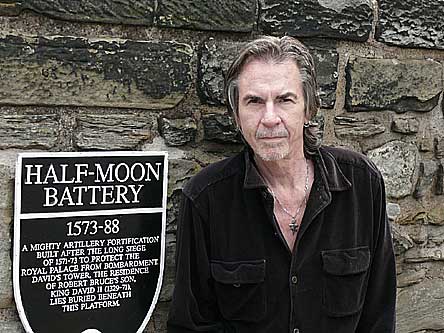 mwe3:
Where are you from originally and where do you live now and what do
you like best about it? Also what are your other favorite cities and
countries to visit?
mwe3:
Where are you from originally and where do you live now and what do
you like best about it? Also what are your other favorite cities and
countries to visit?
Erik Scott: Born in Milwaukee Wisconsin, I was an Air Force
child, as my father flew the earliest jet planes. I’ve spent
half of my adult life either in Northern Illinois/Chicago or in California;
first in LA, then Northern California, which is a wonderful place
to live. I find foreign cities and countries always have a certain
fascination, at least in the short term. The UK has a certain eccentric
and comfortable vibe, and Australia is always fun, and you know what?
I enjoy visiting all the countries of Europe and Japan.
mwe3: How would you compare your new album And The Earth
Bleeds with your 2011 CD Other Planets as for one thing
there’s more vocal tracks added to the instrumental tracks on
the new album. Did you set out to make a more eclectic album that
combined more genres this time? That said, the instrumental tracks
are brilliant on your new album.
Erik Scott: The music of Other Planets is very spacey
atmospheric, and using the steel guitar of John Pirruccello in combination
with the fretless bass really accented that vibe... spaceeeyyyy! Like
going to the planetarium. However, early in the writing process for
“Earth Bleeds”, I was writing melodies that had a real Celtic/Scottish
vibe, so I found Shira Kammen and her medieval violin, the veille.
When she kicks into the Scottish reel parts on “Battle For Neverland”,
it’s not real spacey, it’s real lively. And it got me thinking
“gypsy”, and I reworked a Spanish melody and we recorded
“Gypsy Mother”. To top it off, I added Steve Eisen’s
English whistle and Irish flute, John Pirrucello’s mandolin,
and while still atmospheric as heck, we were no longer whirling around
Jupiter.
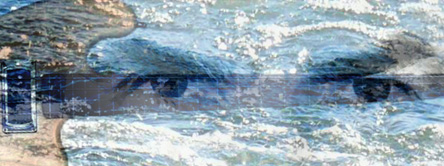 Also, on
the And The Earth Bleeds CD, I gave more of the melodic opportunities
to these other unusual instruments, while on Other Planets,
I played so many of the ideas on the electric bass. I used different
right hand techniques, different upper register phrasing, and I used
echoes and delays normally not used on bass, all to give the Other
Planets collection a creative mood and vibe.
Also, on
the And The Earth Bleeds CD, I gave more of the melodic opportunities
to these other unusual instruments, while on Other Planets,
I played so many of the ideas on the electric bass. I used different
right hand techniques, different upper register phrasing, and I used
echoes and delays normally not used on bass, all to give the Other
Planets collection a creative mood and vibe.
I was also exploring to see how many cool sounds I could make on the
electric bass. Many listeners commented on the cool and unusual guitar
sounds on the album, yet all those sounds were made on the electric
bass.
Electric guitar appears only twice on Other Planets... in "Bassque
Revolution", and in the first part of the title cut.
But you know, I did not plan on any of this. The way I worked on this
project was, there was no plan. For marketing purposes, I suppose
there should have been, but there wasn’t. I knew it was coming
out mightily diverse, but that probably reflects my career. When you
work with artists as diverse as Alice Cooper, Pops Staples, Flo &
Eddie, and Sonia Dada... Sonia Dada combined black and white musicians
with backgrounds in rock, gospel, R&B, psychedelic jam bands,
jazz, and folk, and I think some of these collisions of musical cultures
has influenced the unconventionality of my solo work.
I wrote some words when I thought that maybe the music alone wasn’t
saying all everything that I wanted to say.
 mwe3:
And The Earth Bleeds features you recording with a number of
musicians in other cities. Can you shed some light on how the album
was recorded? Was it mainly done over the internet with the musicians
recording their parts in different cities and how did that process
go?
mwe3:
And The Earth Bleeds features you recording with a number of
musicians in other cities. Can you shed some light on how the album
was recorded? Was it mainly done over the internet with the musicians
recording their parts in different cities and how did that process
go?
Erik Scott: No, it was not done over the internet. Only in
two cases was I not in the room recording any guest musicians:
Ana maria Botero’s voice was recorded, by her partner in the
band RottViolent, Pablo Andres, in Bogota Columbia. I sent the lyrics
and guide vocal, and she sang it... and very beautifully. And Steve
Eisen’s English Whistle on “Run” was recorded in Chicago
by long time pal Chris Cameron, because I couldn’t make the trip.
Those were the only two instances I wasn’t doing the recording.
I have found, in being both the guest player, and the writing/producing
artist, that you have to be there, in the room, connecting with the
artist or players while it is happening. Otherwise I just don’t
get what I want. I had very specific ideas of what I wanted another
instrument to do.
Because I had done so much of the tracks myself... drum programming,
keyboards, melodic and sometimes also a rhythmic bass, percussion,
and the vocals on four songs... I had specific arrangements in mind
by the time I was ready for another instrument to make their contribution.
Plus, being alone in the studio so much, I just love getting out and
getting in the company of other musicians... it’s more fun.
The internet gives advantages, but there is still nothing better than
musicians being in the same room making it happen.
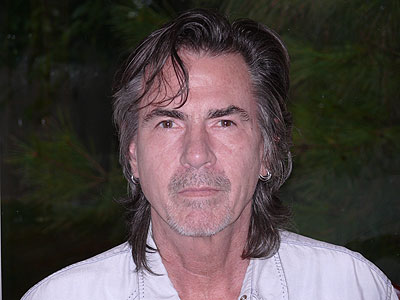 mwe3:
Tell us something about your gear setup at your studio in Northern
California. What basses do you play now and how has your choice of
basses changed over the years? What about other favorite guitars and
keyboards that you use on the new CD?
mwe3:
Tell us something about your gear setup at your studio in Northern
California. What basses do you play now and how has your choice of
basses changed over the years? What about other favorite guitars and
keyboards that you use on the new CD?
Erik Scott: In my very own Tuna Salad Studios, I have a Macbook
Pro with Pro Tools. I have a Roland XP 50, and a Korg Chrome keyboard
setup, with an old MPC 60 drum machine. I always start by using a
beat or sample I have programmed, and when I get something that I
like, I will overdub a human drummer. Sometimes I use the human parts,
and sometimes a combination of programmed and human.
My favorite basses are a ‘Frankensteined’ 1964 Fender Jazz
bass, and a Pedulla fretless buzz bass from 1992. A Lakland bass also
gets called on at times. The upper register bass melodies are often
run through a Zoom 708II effects pedal, and I use a Demeter DI.
When recording the violin, percussion, vocal, or any other acoustic
instrument, I’ve got a couple AKG mics which I run thru Neve
modules. That’s about it. When I leave Tuna Salad to go record
somebody in a different location, I take the Focusrite Scarlett 18i8
audio interface, and my mac.
mwe3: The lead off cut is really a great introduction to the
album. Can you tell us the story behind “Gypsy Mother And The
Royal Bastard”? It’s just great. For example, what instruments
are you playing on that track? It’s like Gypsy Prog Instrumental!
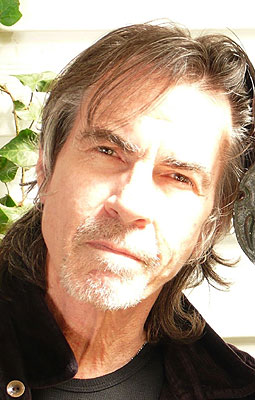 Erik
Scott: About “Gypsy”: in my head, I started what seemed
to me like a Spanish trumpet-type melody a couple years ago, playing
it in the melodic range of the bass. And I developed it to a complete
stage, but it just didn’t hit the spot. I always came back to
it though, because I really liked playing the melody.
Erik
Scott: About “Gypsy”: in my head, I started what seemed
to me like a Spanish trumpet-type melody a couple years ago, playing
it in the melodic range of the bass. And I developed it to a complete
stage, but it just didn’t hit the spot. I always came back to
it though, because I really liked playing the melody.
And then I had Shira over for another song and she played her veille.
So I rearranged the piece to include the violin... actually, the veille...
I love saying medieval violin... ha!
The intro is given to the veille, with some synth strings accompanying.
Then the rhythmic drums come in, and the fretless makes a statement.
Then I go rhythmic and the violin takes it again... back and forth
as the track builds, keeping the same melodic theme. I had the power
riff next, which I loved, but for awhile I thought maybe it was too
heavy for the album. But by then I had the title “Gypsy Mother
And The Royal Bastard”, and I knew the heavy part belonged. I
guess my rock roots had something to do with it.
I wrote and played the bridge, then strengthened the rhythm for a
final violin verse. A haunting fade with the right sound on the Chrome,
and we ride off into the sunset.
So to answer your question, the track just has programmed drums and
percussion, the Pedulla fretless, the Korg Chrome synth, and Shira’s
veille.
mwe3: It must have been great working with Flo & Eddie
and Alice Cooper “back in the day”. Do you look back on
that era 40 years ago and go wow? I was at that Christmas ‘74
show at the Troubadour and I was talking to the band so I might have
met you there! Do you keep in touch with Howard and Mark and Alice
these days? Do you miss that amazing mid ’70 scene in L.A.? Also
your 1968 album with the group Food is well worth hearing! 46 years
ago already!
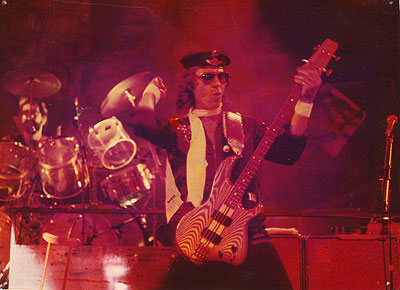 Erik
Scott: Well you just asked 18 questions! Ha! But seriously, you
were at that 1974 show? How cool is that! It must have been cool in
the audience, as the buzz went around: ”Alice Cooper is here
with Keith Moon... they gonna get up there?” I know I was buzzed
in the band…the brand new kid from the midwest. Yeah? Alice and
Keith Moon? Of The Who?” Yes, that era provides many memories
and stories for sure.
Erik
Scott: Well you just asked 18 questions! Ha! But seriously, you
were at that 1974 show? How cool is that! It must have been cool in
the audience, as the buzz went around: ”Alice Cooper is here
with Keith Moon... they gonna get up there?” I know I was buzzed
in the band…the brand new kid from the midwest. Yeah? Alice and
Keith Moon? Of The Who?” Yes, that era provides many memories
and stories for sure.
And Mark and Howard, as Flo & Eddie and the Turtles... we went
out with the Starship, Doobie Brothers, Steve Stills, and Fleetwood
Mac most of 1975 and ’76, which was graduate school for this
kid from Gurnee. I still talk with those guys. Alice is always comin’
thru on tours, Mark and Howard are summer tour-meisters with the legacy
shows, and the internet has brought old buddies back into the picture.
You know about that 1968 Capital record by Food? Great Caesar’s
Ghost, you are well informed.
mwe3: How are you approaching this new album, And The Earth
Bleeds in terms of getting the word out? The U.S. is so huge that
touring across the country is a real daunting task for an indy artist.
Do you always write music and record new ideas in between albums?
What kind of musical direction would you consider going in next?
 Erik
Scott: Touring is expensive, especially for independent artists,
which is where I am now, but I’d really like to do some live
things. It’s time, and I hope to get some guys together and do
exactly that.
Erik
Scott: Touring is expensive, especially for independent artists,
which is where I am now, but I’d really like to do some live
things. It’s time, and I hope to get some guys together and do
exactly that.
In the meanwhile, it’s one of the things the internet can help
a bit with... getting the word out there about your music. Of course,
there is soooo much music out there, it can be difficult to get your
statement heard.
I’m thinking about doing a... well, I’m not gonna say, because
maybe somebody else will try it before I get to do it. But I will
try to do what I always try to do, something that is not exactly like
everybody else is doing. Something with a twist, an unusual partnership
of instruments or an unusual musical culture collision that combines
elements in a way that hasn’t been overdone by others... and
make some cool music.
Thanks to Erik Scott at www.ErikScottBass.com



